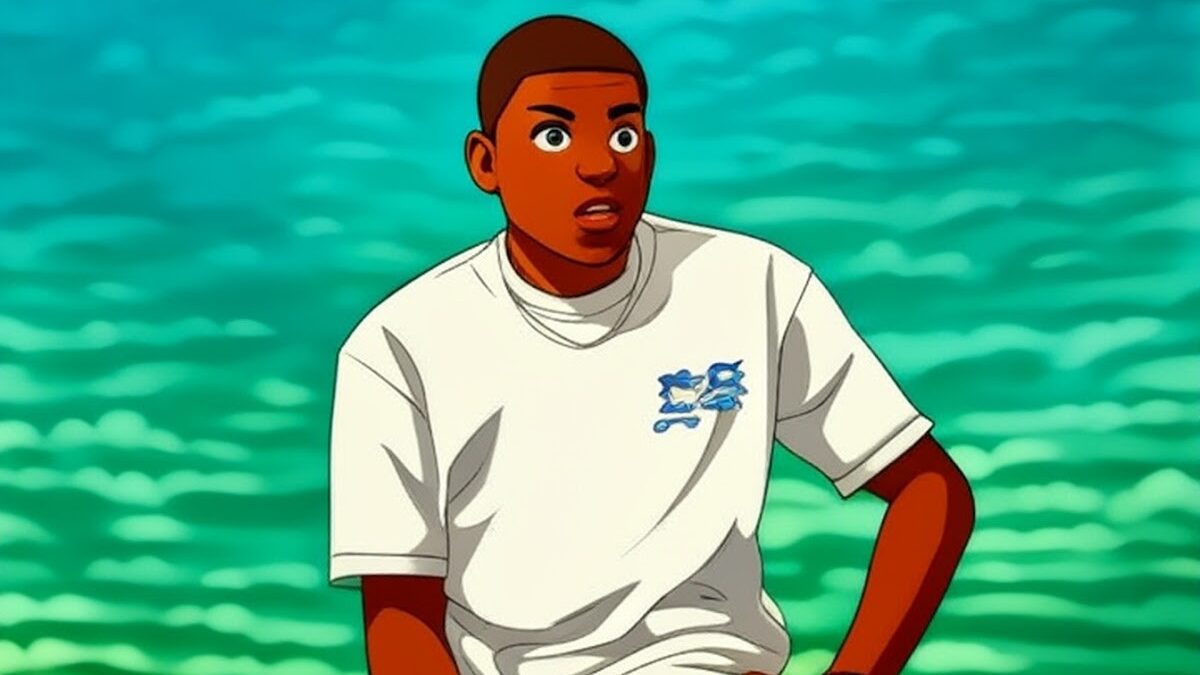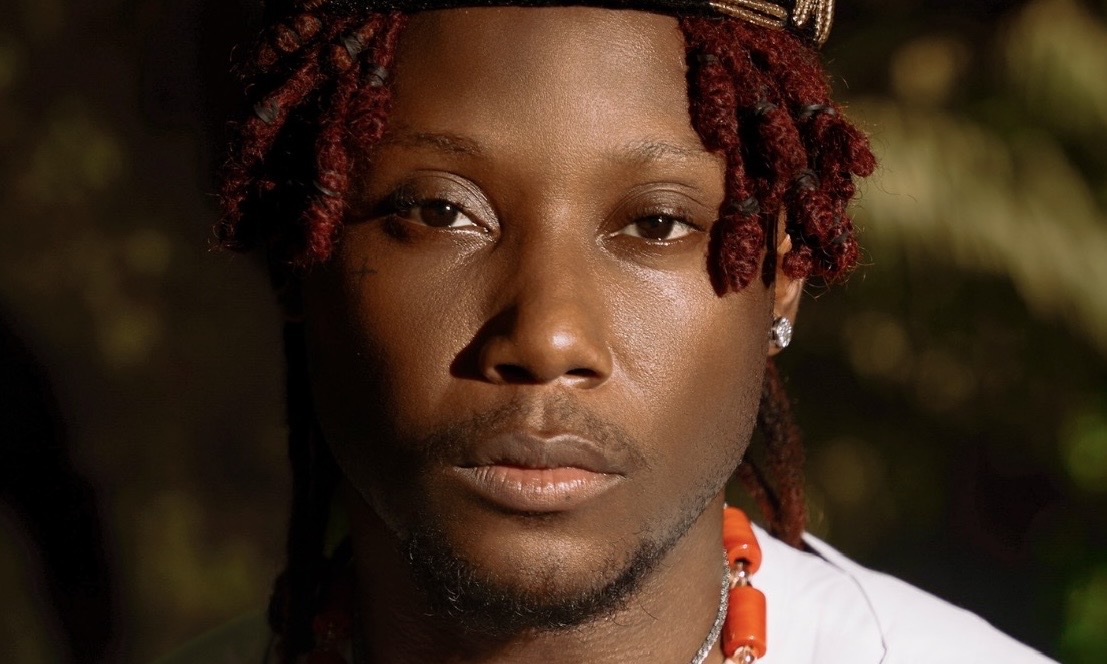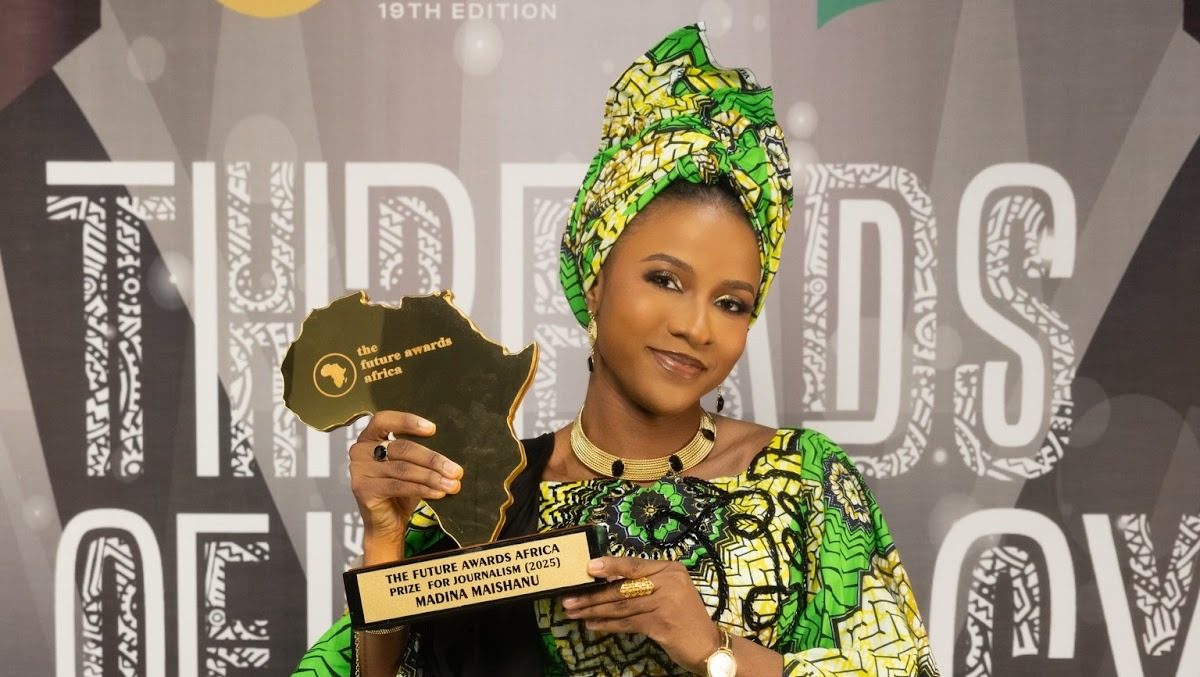Before Emmanuel Oke became the Co-founder of Notesphere and founder Cosamote, he was Emaxee—a rapper with a cult following on campus and a name he coined from his own, Emmanuel, and a Yoruba phrase, “ema si,” that loosely means “you will receive it” or “you see what I’m saying.” “It’s like when someone does something and you say, ‘ema si, you go collect,’” he laughs. “It’s just a mix of Yoruba and my name.”
These days, Emaxee has been retired—“a failed rapper,” he says plainly—but Emmanuel has found something more lasting on the other side of performance. He is a creative strategist, a designer, and a builder of communities and platforms. Through Cosamote and Notesphere, he has carved out space for artists, producers, and creatives to collaborate, work, and dream, without needing to be the one in front of the mic.
What keeps him grounded is equally layered. Emmanuel speaks often of his mother, who raised him in Osogbo and remains his biggest support system. He talks about her prayers, her faith in him, and how she once signed him up for graphic design classes before he even set foot in university. His twenties have been far from quiet, marked by both personal upheaval and professional wins, but for someone who often jokes that he is an “old soul,” he has handled it with remarkable clarity.
In this interview, we talk about the toll of ambition, what he’s sacrificed to build something lasting, and what it means to keep roaring while the world is watching.
When people hear “25-year-old founder,” it sounds impressive—but what’s the part of that story they don’t see, and what’s been the hardest part of building Notesphere and Cosamote while still trying to be in your twenties?
Emmanuel Oke: It definitely sounds impressive from the outside, but people don’t really see the hard parts. For one, being broke. I’m not a trust fund kid. I mean, my mum did her best, so I won’t say I was poor, but right after Cosamote started, I got kicked out of where I was staying and ended up homeless for a bit. That really destabilised me. It was one of those moments that made me question everything—whether I should still be making music, whether I should just focus on surviving.
Cosamote started as a community, a creative circle made up of people I was designing for, working with, or making music with. A lot of people who featured me on their songs back then also became part of it. Over time, it grew into something more structured. We started bringing in producers and finding ways to make the collective a platform that also represented them. Eventually, it became what it is now: an agency, a space, a hub. And we’re even about to release our own project soon.
But it wasn’t easy. The early days were rough. I had skills; I could design, and I could shoot but I had to start thinking long term. How do I make money from this? How do I sustain myself when the passion isn’t paying yet? That was the hardest part.
You’ve worked with Warner Music, Mavin Record, Jozing World and are building platforms that shape how music moves on the continent, why this side of the industry? Why not stay an artist or become a producer?
Emmanuel Oke: To be honest, this side of the industry chose me. Back in school—University of Ilorin—I had some clout as a rapper. But I also had design skills, and slowly, artists started seeing me as more than a fellow creative. I wasn’t just the guy who could do cover art—I was suggesting they make lyric videos, build their YouTube channels, and think about branding. And I’d offer all of that at a fair price.
Eventually, people started coming to me not just for features or visuals, but for full-on creative strategy. By my 300 level, I was managing my friend AYK Beats just so I could hang in the studio. I was designing, managing, doing marketing, and still rapping. That’s how I got noticed by other people, and that eventually led to working with Mavin Records.
So yeah, I didn’t plan to do this side, but it made sense. I realised that structure, systems, and support were just as powerful as being the one holding the mic. And maybe even more sustainable.
Do you ever feel young in industry rooms? How do you navigate age, experience, or impostor syndrome?
Emmanuel Oke: Funny enough, I don’t really feel young anymore. I feel old. At Mavin, I was probably the youngest in the company at the time, like 20. But even then, people wouldn’t believe my age. I’ve always had this “old soul” energy. My mom raised me like that: serious, focused, and always thinking ahead.
Because of that, I was often given responsibilities beyond my years. I was handling things I hadn’t even matured into yet. So while I was technically young, I didn’t get treated that way, and I didn’t feel it.
There were times I’d suggest things, and people would be like, “Hmm, okay, I like this guy.” But mostly, I think my energy has always been older than my age. Now I’m just 25, but I feel 35 sometimes.
You’ve achieved a lot; do you ever feel like you had to grow up too fast or skipped the carefree parts of your twenties?
Emmanuel Oke: Yes, absolutely. I’ve been nudged to work hard since I was 12. My dad died when I was 13, and after that, there was a lot of pressure not to slack. You hear things like, “Your uncles and aunties won’t always be there.” That kind of pressure sticks.
Before I even entered university, my mum had already registered me for graphic design classes. She even wanted me to learn barbing. So by the time I was 16, 17, or 18, I already felt like I wasn’t doing enough. Sometimes, even now, I feel like I’m not doing great enough. It’s this internal voice that’s always saying, “More, more, more.”
But I’ve learnt to breathe. To remember that I have time. That life is long. God’s purpose will be fulfilled over time. I don’t have to kill myself chasing it all now.
What does ambition look like for you now, and how has it evolved?
Emmanuel Oke: It’s clearer. In my early twenties, I was very confused. People followed me because I was an artist. I had fans. But at the same time, I had companies trying to hire me because of my design and strategy skills. I didn’t know where to focus.
Eventually, I had to make a decision. I had to choose a path and sacrifice the other, for now. And there’s been so much growth since then. I went from doing random designs to sitting in the biggest label offices. The other day I spent almost eight hours with Joey Akan, just talking. This was someone I used to dream of sharing my music with when I was 17.
So yeah, ambition now is sharper. I know what I want. And I can see where I’m going.
Being in your twenties means constantly becoming while the world is watching—how do you stay grounded? Who or what helps you feel like yourself again when things get overwhelming?
Emmanuel Oke: My mom, for sure. She’s been the most consistent thing in my life. She calls, she prays, and she tells me things that centre me. And my faith, reading the Bible, and understanding God’s promises, that’s grounding.
Also, movies. When I’m overwhelmed, I turn to comedy. Just this week, I watched Horrible Bosses again. I needed to laugh. I needed not to think. I looked up IMDb’s Top 100 comedy movies and just started watching them back-to-back. That helped.
I also love interviews and TED Talks. I watch people I admire— Pharrell Williams, Steve Jobs, Jay-Z, and Kanye West before he…yeah. Tim Cook too. I’m a big fan of tech, so that’s a space I know I’ll eventually step into.
Would you say your 20s are roaring? On a scale from 1-10, how loud is the roar?
Emmanuel Oke: Definitely an 8 out of 10. My 20s are roaring. I’m super career-focused. I barely party unless someone owes me money there. I’m serious; even when I’m hanging out, I’m thinking of work. Like, sprinkle a little fun, but I’m back to plotting the next thing.
Back when I was 22, I probably wasn’t the best friend to have. I was so tunnel-visioned. But now I’m learning balance. I can make space for people, for laughter, for breaks. Still, I’m intense. It’s just who I am. And honestly? I like it.





